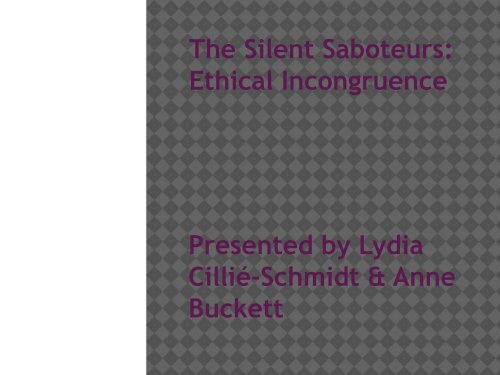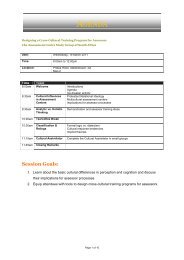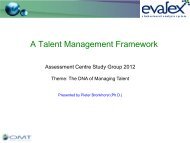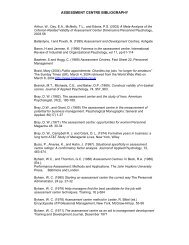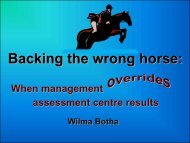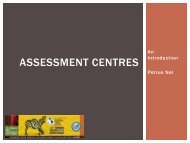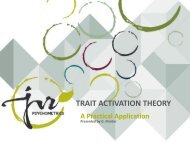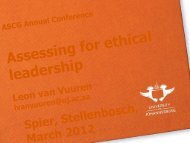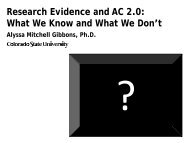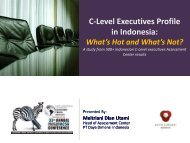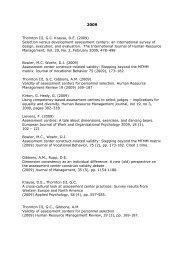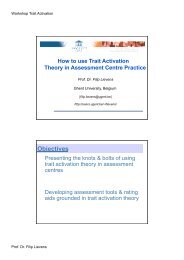The Silent Saboteurs: Ethical Incongruence Presented by ... - ACSG
The Silent Saboteurs: Ethical Incongruence Presented by ... - ACSG
The Silent Saboteurs: Ethical Incongruence Presented by ... - ACSG
Create successful ePaper yourself
Turn your PDF publications into a flip-book with our unique Google optimized e-Paper software.
<strong>The</strong> <strong>Silent</strong> <strong>Saboteurs</strong>:<br />
<strong>Ethical</strong> <strong>Incongruence</strong><br />
<strong>Presented</strong> <strong>by</strong> Lydia<br />
Cillié-Schmidt & Anne<br />
Buckett
Introduction<br />
<strong>Ethical</strong> scandals<br />
often exposed in<br />
the national and<br />
international media<br />
Account for only<br />
about 10% of the<br />
business losses<br />
Other 90% of losses<br />
is caused <strong>by</strong> the<br />
intentional,<br />
counterproductive<br />
behaviour of
Objectives of presentation<br />
To recap the<br />
definition of ethics<br />
To describe the<br />
various forms of<br />
<strong>Silent</strong> <strong>Saboteurs</strong><br />
To discuss what can<br />
be done to<br />
eliminate them<br />
To review the<br />
presence of <strong>Silent</strong><br />
<strong>Saboteurs</strong> in
Outline of presentation<br />
A quick reminder of what ethics is about<br />
who/what are the silent saboteurs ?<br />
<strong>The</strong> different forms of silent sabotage<br />
A different form of benevolent sabotage –<br />
Hacking work<br />
What can be done to address the silent<br />
saboteurs?<br />
What are the silent saboteurs in assessment<br />
centre practice?<br />
What can we as assessment centre practitioners<br />
do to counteract the silent saboteurs?
What is ethics?<br />
What is your<br />
definition of<br />
ethical<br />
behaviour?
Definition of business ethics<br />
“<strong>The</strong> principles, norms<br />
and standards that guide<br />
an organisation’s conduct<br />
of its activities, internal<br />
relations and interactions<br />
with external<br />
stakeholders.”<br />
Report<br />
King II
What is ethics?<br />
In South Africa we have guidance from:<br />
HPCSA<br />
Labour Relations Act<br />
Basic Conditions of Employment<br />
Employment Equity Act<br />
<strong>ACSG</strong> Best Practice Guidelines
Ethics in Assessment Centres<br />
Fairness<br />
Objectivity<br />
Standardisation<br />
Transparency / openness
<strong>The</strong> silent saboteurs<br />
Sometimes our<br />
work<br />
relationships, our<br />
productivity, job<br />
satisfaction, and<br />
trust in our<br />
colleagues are<br />
damaged <strong>by</strong> the<br />
subtle and<br />
subversive games<br />
that people play<br />
It appears in the<br />
way we treat each
Feeding the Hog
Activity 1<br />
Review checklist<br />
Identify silent saboteurs that you have<br />
encountered in the workplace<br />
5 minutes
<strong>The</strong> cost of the silent<br />
saboteurs<br />
<strong>The</strong> cost of these<br />
activities:<br />
Motivation and<br />
morale<br />
Stress<br />
Quality<br />
Staff and financial<br />
turnover<br />
Productivity<br />
Pride
<strong>The</strong> cost of the silent saboteurs<br />
Navran estimates that<br />
for a mid-sized to large<br />
company, losses<br />
resulting in unrealized<br />
productivity and<br />
profitability due to<br />
these behavioral types<br />
of problem could range<br />
from $5000 to $7000<br />
per employee per year
Benevolent sabotage<br />
Richard Saunders (not his real name) is a benevolent hacker. He<br />
works for one of those banks that did its job so well in 2008 that<br />
we landed in the worst financial hole we’ve seen since the Great<br />
Depression<br />
As the crisis unfolded, the bank’s senior executives cried out,<br />
“Reports! Our kingdom for more reports!”<br />
<strong>The</strong> problem was that what they really wanted—useful, insightful<br />
analysis—couldn’t easily be produced with the software provided <strong>by</strong><br />
corporate IT<br />
Poor Richard. What to do? Work 29 hours a day, 10 days a week, to<br />
manually create those reports and the much-needed analysis?<br />
No way. He hacked the system. He softened up a vendor, got a<br />
password, tapped into the database, and began creating neverbefore-possible<br />
reports for the C-suite<br />
Would the bank’s auditors and IT security guys freak out if they<br />
knew that Richard had hacked their system? Uh, yes<br />
But since then, Richard has become incredibly productive and is<br />
now a go-to guy companywide. He’s a hero to all those senior execs<br />
who wanted more than data dumps. If only they knew the full story
Benevolent sabotage<br />
Do you know the<br />
cheat codes for<br />
work?<br />
Do you know how<br />
to save business<br />
from itself?<br />
Hacking Work<br />
will show you<br />
how…
Benevolent sabotage<br />
Try to identify what<br />
the concept of<br />
“Benevolent<br />
Hacking” means<br />
when viewing the<br />
following video clip
Benevolent sabotage<br />
Hackers work around<br />
the prescribed ways of<br />
doing things to achieve<br />
their goals<br />
<strong>The</strong> benevolent among<br />
them do this rule<br />
bending for the good of<br />
all<br />
And once frontline<br />
performers and middle<br />
managers try hacking<br />
work—and discover<br />
they’ve increased their
<strong>Silent</strong> <strong>Saboteurs</strong> vs. Benevolent Hackers<br />
Good<br />
Is there a<br />
difference<br />
using the<br />
definition<br />
of ethics?<br />
Self<br />
Other
Activity 2<br />
What are the silent saboteurs in AC<br />
practice?<br />
Identify the key silent saboteurs in AC [e.g.<br />
turning a blind eye, accepting less than stellar AC<br />
practices, not keeping your skills current etc.]<br />
Brainstorm for solutions to silent<br />
saboteurs<br />
15 minutes
What to do?<br />
Perceptions must be aligned with the company<br />
culture<br />
Clarify expectations for all stakeholders e.g.<br />
test administrator, assessor, participant<br />
Proactive communication and candour<br />
Supervisor/manager must take an active<br />
personal role<br />
Employees must have a clear knowledge of<br />
their organization's ethical standards and<br />
have a feeling of management support when<br />
they act within those standards
What to do?<br />
Management must demonstrate through<br />
consistent examples their personal alignment<br />
with documented ethical principles and values<br />
Organizations must “walk the talk”<br />
Self-serving people are destructive over the<br />
long run<br />
Relationships are ruined and trust is destroyed<br />
Integrity, openness, fairness and credibility,<br />
are the vital elements
What can we as AC practitioners do?<br />
Keep up to date with local and<br />
international best practice standards<br />
Don’t compromise on your principles<br />
“Phone a friend”<br />
Is it legal?<br />
Is it right?<br />
Will you openly tell others?
Sources<br />
Bill Jensen and Josh Klein, Hacking Work:<br />
Learn to love the rule breakers. January–<br />
February 2010. Harvard Business Review<br />
Positive Employee Practices (PEP):<br />
http://www.navran.com/<br />
http://www.onlineethics.org/cms/4745.aspx


